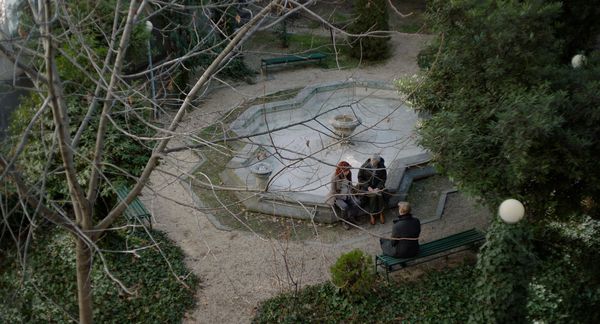 |
| Unser Kind |
For some people, having a child that is biologically theirs is one of the most important things in life – yet for roughly 15% of couples, this proves to be a struggle. One of the options for those who can’t achieve a successful pregnancy no matter what they do is to use the services of a surrogate. When they learned that surrogacy is illegal in their country, and that as a result people often travel abroad to arrange it, Swiss writer and director team Philippe Grob and Samuel Flueckiger were moved to start work on the short film Unser Kind (which translates as Our Child).
The film also has another origin point, in that Grob had read a story about an Australian couple who made a drastic decision after learning that one of the twins being carried by their surrogate in Thailand had Down syndrome. Unser Kind deals with a similar situation, giving it an additional layer of complexity and a second set of issues to explore.
 |
| Unser Kind |
“It was a very emotional journey, to make this film,” says Samuel at the press conference also attended by stars Lucy Wirth, Jürg Plüss and Gano Salome Gerliani. “We started thinking about it in 2019, and then we wrote it during the pandemic. Financing and all of that happened later on, and we finally shot it this February.
“With all my films, I really try to encourage the audience to reflect on certain social issues that are important to me and my collaborators, and it was very much the case here as well. That sort of question, ‘What would I do in that situation?’ was really the one that we wanted the audience to ask themselves.”
He was lucky to attract a cast of highly experienced actors, he says.
“I'm really grateful for their contributions. And with Gano, once we were in Georgia and started to cast, it was one of those magical casting moments where without having met each other before and without having too many conversations before, it was instantly clear that she embodies this character wonderfully. I’m really grateful that we met and that she joined our project.”
Lucy, who plays the Swiss woman anxious to have a child, says that she found herself deeply drawn to her character and the challenge of playing her.
“I was really interested in that deep dilemma, and I was really interested to try to defend the character because she could be easy to condemn. You know, she's privileged. She's going to a country and having someone get pregnant who could also be exploited. I think there's lots of aspects about it that you could condemn, so I was really interested in trying to find the vulnerability and humanity in her.”
“When I read the script for the first time, was very compelling, and it deeply touched me, despite its brevity and its minimal dialogue,” says Jürg. “I wanted immediately to dive into that character, and Lucy helped me a lot. It was really a pleasure to work to with her, and she had a really strong presence. I just had to look on her and could react. We had quite a good connection to each other.” I note that men are often treated as secondary where this subject is concerned, and ask how he approached showing us Michael's interior experience and imagining his journey.
“I think the point where they have the discussion with the director of the hospital, I think I would quite react quite similarly,” he says, but it becomes apparent that he’s struggling to articulate what he wants to say in English, so Samuel steps in.
 |
| Lucy Wirth and Jürg Plüss in Unser Kind |
“I think what Jürg was going to speak to was something that we talked about a lot when working on the role. Michael is forced to be an observer. He's not experiencing the emotional complexity that the intended mother, Hanna, is experiencing and that the surrogate, Mariam, is experiencing. He's also not going through those physical challenges that a pregnancy can present. I think that really makes him struggle to be supportive to his partner and to the process. But at the same time, he obviously, as a intended father, is also very much emotionally involved and therefore torn in a way.
“We actually did not rehearse a lot, but we had a lot of conversations at first individually. At a certain point we started to join our conversation and it was the three of us, and then went on this journey together. And in Georgia, on location, we did a little bit of an exploration of the spaces we were going to be shooting in, and we did another read through. But it was mainly really deep and also emotional conversations.”
“I've always had a big thing for family, mother and child connections,” says Gano. “I always wanted to portray it in a role and it was a dream for me to do it, so I guess I can say dreams come true.” She laughs. “I remember when I read the script of Unser Kind, I felt so close with Mariam and every decision she made. Everything was just like logic for me and she just clicked in my mind.”
There is discussion of the way that the film ends.
“You could call it sort of an open ending, leaving certain narrative threads untied, certain questions unanswered,” says Samuel. “That was really the intention, because I personally feel like that's an invitation for the audience to reflect on the underlying issues of the film, and maybe develop their own opinion and engage in a constructive debate about these topics. I feel personally that's where cinema and films can be really powerful.”
The direct focus of the film is obviously on surrogacy, I observe, but did they see this as a means of tackling wider questions about how people react to learning that a child would be born disabled, and about the lack of consideration often given to that possibility when planning a pregnancy?
Samuel nods. “Yes. The intention of this film was to raise and to show the ethical complexities of surrogacy, but all the underlying issues as well, and to ask questions that then hopefully the audience will feel inspired to answer for themselves and then to start discussing. I think that applies here as well.”
 |
| Gano Salome Gerliani and Lucy Wirth in Unser Kind |
He studied sociology rather than going to film school, he explains.
“ I'm really interested in the social fabrics of society and the relationships and social interactions that these fabrics are made of. Especially when these interactions and relationships are tabooed or stigmatised – my ears perk up and I get very interested. And this was also the reason why the topic of surrogacy and the prohibition of surrogacy in Switzerland interested me so much.
“We were very lucky to have the film première in Los Angeles at the LA Shorts festival. It was just wonderful to learn that it resonated with the audience and the jury so much that we won the Best of the Fest award there and therefore qualified for next year's Oscars. We've had great opportunities to show the film at festivals in Europe as well. I was just recently in Cyprus at the International Short Film Festival of Cyprus, where, again, we had a great screening. We're still in the midst of submitting, and we're hoping for more opportunities to share the film and grow our audience around the world.”





















